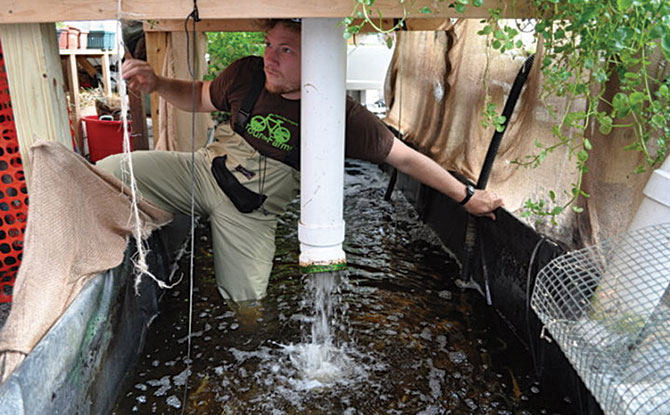Jesse Meeder: Fish Farmer

Get to know a Buffalonian...
Jesse Meeder: Fish Farmer
We’ve grown accustomed to hearing about sustainable endeavors like urban farming around town, but fish farming? Who knew? Thanks to the Massachusetts Avenue Project’s ambitious aquaponics (aquaculture plus hydroponics) system, fresh fish raised locally and sustainably on Buffalo’s West Side is a reality.
What are you hoping to accomplish through the Mass Ave Project’s aquaponics project?
Our primary objective is to provide access to affordable, nutritious, local food in neighborhoods where such access is limited or non existent. One of the ways we are tackling this objective is by raising fish on our urban farm, in addition to the thousands of pounds of vegetables we produce every year. We are aiming to create a source for healthy, affordable, and extremely local fish protein right on Buffalo’s West Side.
What steps have you taken to make the project sustainable and low impact on the environment?
We have done our best to replicate a tropical river system, simulating a majority of the elements that would exist naturally, including invertebrates, composting soil, plant life, solar energy, and micro-organisms. Our fish systems are essentially wasteless, using only 10% of the water that a traditional fish farm would use, while none of our tanks ever need to be cleaned out or drained. Any water we do use is gathered from rainwater that is collected on our farm. Any fish or plant waste that is generated is used to feed plants, vegetables, worms and chickens. One of the most important things we do is create our own fish food, from vegetables, aquatic plants, insects, algae, and plankton. This means that we don’t have to rely on buying expensive commercial feed which often is created from wild caught fish, corn, soy, and even land mammal protein.
Why specifically did you choose tilapia? What about that species was attractive for farming purposes?
Tilapia are an omnivorous, hardy fish that grows quickly and is an extremely efficient converter of feed to protein. There is also a readily available market for Tilapia—it being the 5th most eaten fish in the world.
What are the biggest challenges you face with the farm? Is it hard to maintain during the winter?
We are always learning new things about raising fish, especially as we expand our operations and become more and more commercially minded. The biggest challenge raising Tilapia is getting them to grow quickly and uniformly in order to satisfy customers. It is fairly easy to raise Tilapia and keep them alive, it is much much harder to make money growing them. Our systems are designed to work efficiently through the winter. The only difference is a slow down in plant growth due to less sunlight. If we were concerned about that, we could add supplemental lighting. I also have to shovel snow off of the greenhouses occasionally.
Ultimately, how practical is urban fish farming? Is this something we could expect to see in the future?
I believe it has a lot of potential as an efficient means of food production for the future. The methods we are using are still fairly nontraditional, although there are many people and groups around the country and world that are starting to shift from traditional fish farming towards the aquaponic model. Our aquaponic systems require a fair amount of day-to-day labor, but we have many teen employees that are eager and capable to participate in the maintenance of the farm. In my opinion, local and urban food production will be critical to a successful future for our world going forward.
Bonus: How have local chefs responded to the fish?
We have an immense amount of interest from local chefs, and are hoping to be able to supply many local restaurants with fresh Tilapia in the near future.
Bonus: Where are you hoping to see the project go in the future?
We are getting set to launch our new aquaponic greenhouse this winter, which will expand our fish production from about 1,500 pounds annually to 35,000 pounds annually. If successful, we are open to growing further and expanding to different species of fish. We want to show that a local farm can truly create jobs, economic opportunity, and healthy, quality food for our city and region.
blog comments powered by Disqus|
Issue Navigation> Issue Index > v9n49 (Winter Food Issue, week of Thursday December 9) > Jesse Meeder: Fish Farmer This Week's Issue • Artvoice Daily • Artvoice TV • Events Calendar • Classifieds |









 Current Issue
Current Issue